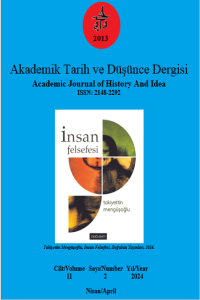Öz
i
Okul öncesi çocuklarının din eğitimi, çocuk psikolojisi verilerinin kullanımıyla daha nitelikli hale getirilmiştir. Bu nedenle eğitim ve psikoloji birbirini tamamlayan bir bütünün parçaları gibidir. Çocuğun zihinsel, duygusal ve manevi gelişiminin bütün tazeliğini koruduğu ilk çocukluk dönemi, çocuğun gelecek hayatının bir çekirdeği hükmündedir. Bu çekirdeğin filizlenmesi aşamasında, eğitim öğretim açısından en önemli görev, anne babaya düşmektedir. Dini kavramların oluşum sürecinde, çocukların öncelikli olarak, öğrenme sürecinden geçirdikleri dini kavramların bir imajını kopyaladıkları, bu imajı zihinlerine kaydettikleri, yeni algılamalar neticesinde her bir kavramın tasavvurunu geliştirerek daha sonra kullanılmak üzere zihinsel bir şema oluşturdukları kabul edilmektedir. Her çocuğun dini gelişim sürecinde Allah, peygamber, ibadet, dua ve evrensel değer kavramlarının gelişimi ve eğitiminde bu süreçlerin yaşandığını görürüz. Din eğitiminin hedefleri açısından değerlendirdiğimizde, dini kavramların zihinsel ve duygusal açıdan sağlıklı bir şekilde içinin doldurulması, çocuğun gelecek hayatında daha anlamlı ve dengeli bir hayat sürdürebilmesi için gereklidir. Dolayısıyla böylesine önem arz eden çalışmamızın amacı Türkiye’de erken çocuklukta dinî gelişim sürecinin incelenmesidir. Çalışmada tarama modeli kullanılmıştır. Çalışmamız nitel bir çalışmadır. Araştırma tasarımı olarak betimsel ve nedensel tasarım tercih edilmiştir. Çalışmada yine literatür taramasında ulaştığımız veriler genel değerlendirme yapılarak kullanılmıştır.
Anahtar Kelimeler
Kaynakça
- Akıncı, A. (2005). Hayata Anlam Vermede Dini Değerlerin ve Din Öğretiminin Rolü. Değerler Eğitimi Dergisi, 3 (9), 7-24.
- Başaran, İ. E. (1994). Eğitim Psikolojisi, Modern Eğitimin Psikolojik Temelleri.
- Bilgin, B. (2007). Eğitim Bilimi ve Din Eğitimi, Gün Yayıncılık.
- Buhârî, Ebû Abdillâh Muhammed b. İsmâîl İbn İbrahîm b. Müğîre b. Berdizbeh (ö. 256/870) (1438/2017). Sahîhü’l-Buhârî (9. Baskı), (Thk: M. Muhammed Mahmûd, H. Nassâr), Dârü’l-Kütübi’l-‘İlmiyye.
- Cebeci, S. (2005). Din Eğitimi Bilimi ve Türkiye’de Din Eğitimi. Akçağ Yayınları.
- Dodurgalı, A. (2010). Ailede Din Eğitimi. Timaş Yayınları.
- Mehmedoğlu, Y. (2003). Erken Çocuklukta Din ve Ahlak Gelişimi. Erken Çocuklukta Gelişim ve Eğitimde Yeni Yaklaşımerdelar (ss.346-357). Morpa Kültür Yayınları. Özeri, Z. N. (2004). Okul Öncesi Din ve Ahlak Eğitimi. Dem Yayınları.
- Peker, H. (2000). Din Psikolojisi. Aksiseda Matbaası.
- Sayar, K. ve Dinç, M. (2011). Psikolojiye Giriş. DEM Yayınları.
- Yavuz, K. (1994). Çocuk ve Din. Çocuk Vakfı Yayınları.
- Yılmaz, H. (2003). Din Eğitimi ve Sosyal Barış, 1. Baskı. İnsan Yayınları.
- Cihandide, Z. N. (2014). Okul Öncesi Din ve Ahlak Eğitimi. 2. Baskı, Dem Yayınevi.
Öz
Religious education of preschool children is made more qualified by the use of child psychology data. For this reason, education and psychology are like parts of a whole that complement each other. The first childhood period, in which the child's mental, emotional and spiritual development preserves all its freshness, is the nucleus of the child's future life. During the sprouting of this nucleus, the most important task in terms of education and training falls to the parents. In the process of the formation of religious concepts, it is accepted that children firstly copy an image of the religious concepts that they have learnt, save this image in their minds, and as a result of new perceptions, they develop the imagination of each concept and create a mental schema to be used later. In the religious development process of each child, we see that these processes are experienced in the development and education of the concepts of God, prophet, worship, prayer and universal values. When we evaluate it in terms of the goals of religious education, it is necessary to fill in religious concepts in a mentally and emotionally healthy way in order for the child to lead a more meaningful and balanced life in his/her future life. Therefore, the aim of this important study is to analyse the process of religious development in early childhood in Turkey. The survey model was used in the study. Our study is a qualitative study. Descriptive and causal design was preferred as research design. In the study, the data we reached in the literature review were used by making a general evaluation.
Anahtar Kelimeler
Religion Islam Religious Development Morality Education Early Childhood
Kaynakça
- Akıncı, A. (2005). Hayata Anlam Vermede Dini Değerlerin ve Din Öğretiminin Rolü. Değerler Eğitimi Dergisi, 3 (9), 7-24.
- Başaran, İ. E. (1994). Eğitim Psikolojisi, Modern Eğitimin Psikolojik Temelleri.
- Bilgin, B. (2007). Eğitim Bilimi ve Din Eğitimi, Gün Yayıncılık.
- Buhârî, Ebû Abdillâh Muhammed b. İsmâîl İbn İbrahîm b. Müğîre b. Berdizbeh (ö. 256/870) (1438/2017). Sahîhü’l-Buhârî (9. Baskı), (Thk: M. Muhammed Mahmûd, H. Nassâr), Dârü’l-Kütübi’l-‘İlmiyye.
- Cebeci, S. (2005). Din Eğitimi Bilimi ve Türkiye’de Din Eğitimi. Akçağ Yayınları.
- Dodurgalı, A. (2010). Ailede Din Eğitimi. Timaş Yayınları.
- Mehmedoğlu, Y. (2003). Erken Çocuklukta Din ve Ahlak Gelişimi. Erken Çocuklukta Gelişim ve Eğitimde Yeni Yaklaşımerdelar (ss.346-357). Morpa Kültür Yayınları. Özeri, Z. N. (2004). Okul Öncesi Din ve Ahlak Eğitimi. Dem Yayınları.
- Peker, H. (2000). Din Psikolojisi. Aksiseda Matbaası.
- Sayar, K. ve Dinç, M. (2011). Psikolojiye Giriş. DEM Yayınları.
- Yavuz, K. (1994). Çocuk ve Din. Çocuk Vakfı Yayınları.
- Yılmaz, H. (2003). Din Eğitimi ve Sosyal Barış, 1. Baskı. İnsan Yayınları.
- Cihandide, Z. N. (2014). Okul Öncesi Din ve Ahlak Eğitimi. 2. Baskı, Dem Yayınevi.
Ayrıntılar
| Birincil Dil | Türkçe |
|---|---|
| Konular | Dini Araştırmalar (Diğer) |
| Bölüm | Makaleler |
| Yazarlar | |
| Erken Görünüm Tarihi | 29 Nisan 2024 |
| Yayımlanma Tarihi | 7 Haziran 2024 |
| Gönderilme Tarihi | 4 Nisan 2024 |
| Kabul Tarihi | 29 Nisan 2024 |
| Yayımlandığı Sayı | Yıl 2024 Cilt: 11 Sayı: 2 |
По всем вопросам приема статей и выпуска очередных номеров обращаться в редакцию соответствующего журнала


